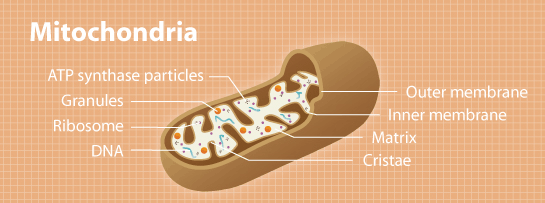
 Featured Mitochondria Products Available from Abnova:
Featured Mitochondria Products Available from Abnova:
- MFN2 monoclonal antibody
- FIS1 monoclonal antibody
- DNM1L monoclonal antibody
- Mitochondria/Cytosol Fractionation Kit
- Mitochondrial Apoptosis Detection Kit
- Mitochondrial DNA Isolation Kit
- Mitochondrial IgG ELISA Kit
Mitochondria are the eukaryotic organelles which carry out oxidative respiration in cells and generate most of the energy (ATP) that the cell needs. These organelles are considered the “power plants” of the cells. The number of mitochondria varies greatly in different eukaryotic cells. Cells requiring lots of energy such as muscle, tissue and liver have more mitochondria than cells requiring less energy such as bone. Besides their central role in energy metabolism, they also play a crucial role in many other metabolic tasks, such as signaling, cellular differentiation, apoptosis, cell cycle and cell growth.
Mitochondria are hypothesized to have once been free-living prokaryotes. They have a double membrane similar to the eukaryotic plasma membrane and contain their own DNA, which is organized as several copies of a single, circular chromosome. The inner membrane is extensively folded into structures called cristae, and is studded with proteins, including ATP synthase, transport proteins and a variety of cytochromes responsible for electron transport and oxidative phosphorylation.
Given their functional importance, mitochondrial disorders lead to several human diseases, including neurological disorders, cardiac dysfunction, and may play a role in the aging process. Diseases are often caused by genetics or mutations to the mitochondrial DNA and can sometimes be inherited. To better understand the mitochondria and the reason for these disorders, Abnova offers polyclonal & monoclonal antibodies, antibodies arrays, proteins, chimera RNAi, ELISA and assay kits to investigate these disorders and the mechanisms that cause them.
Publications
Mitochondrial bioenergetics and dynamics interplay in complex i-deficient fibroblasts.
Moran M, Rivera H, Sanchez-Arago M, Blazquez A, Merinero B, Ugalde C, Arenas J, Cuezva JM, Martin MA.Biochim Biophys Acta. 2010 May;1802(5):443-453.
Abnova product used: MFN2 monoclonal antibody (M03), clone 4H8
Mitochondrial biogenesis and fission in axons in cell culture and animal models of diabetic neuropathy.
Vincent AM, Edwards JL, McLean LL, Hong Y, Cerri F, Lopez I, Quattrini A, Feldman EL.Acta Neuropathol. 2010 May 15.
Abnova product used: DNM1L monoclonal antibody (M01)
Defective DNA Replication Impairs Mitochondrial Biogenesis In Human Failing Hearts.
Karamanlidis G, Nascimben L, Couper GS, Shekar PS, Del Monte F, Tian R.Circ Res. 2010 Mar 25.
Abnova product used: ND1 polyclonal antibody (A01)
Brain region-specific vulnerability of astrocytes in response to 3-nitropropionic acid is mediated by cytochrome c oxidase isoform expression.
Misiak M, Singh S, Drewlo S, Beyer C, Arnold S.Cell Tissue Res. 2010 Jul;341(1):83-93
Abnova product used: COX4I2 monoclonal antibody (M01)
Wild-type human TDP-43 expression causes TDP-43 phosphorylation, mitochondrial aggregation, motor deficits, and early mortality in transgenic mice.
Xu YF, Gendron TF, Zhang YJ, Lin WL, D’Alton S, Sheng H, Casey MC, Tong J, Knight J, Yu X, Rademakers R, Boylan K, Hutton M, McGowan E, Dickson DW, Lewis J, Petrucelli L.J Neurosci. 2010 Aug 11;30(32):10851-9.
Abnova product used: TARDBP monoclonal antibody (M01)
Abnova: The world’s largest antibody manufacturer. Distributed in the UK be Caltag Medsystems.
